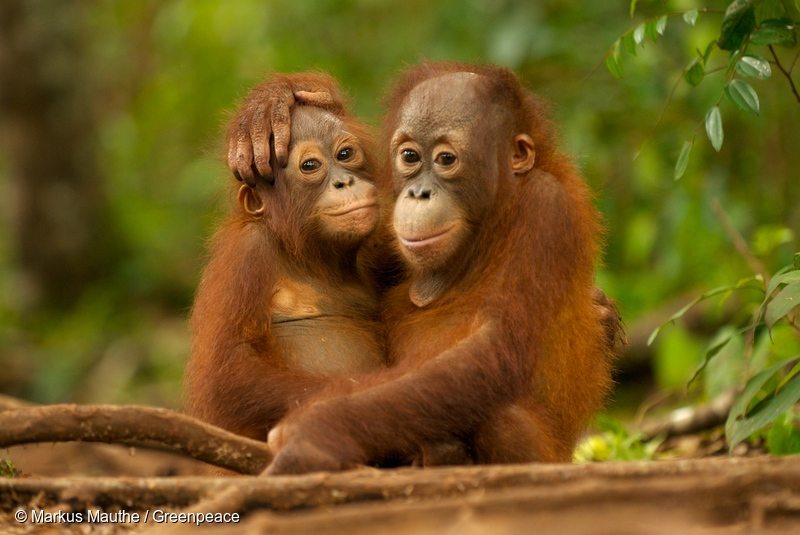A few weeks ago, we had a brief cupcake emergency. Fortunately, Greenpeace supporters stepped up to the challenge, sprung into action, and compelled cupcake maker Betty Crocker to act on palm oil connected to deforestation.
General Mills is one of the largest food manufacturers in the world and it uses palm oil in a number of its products, including Betty Crocker cake mix and canned frosting. One of General Mills’ suppliers is IOI Group, a Malaysian palm oil giant with plantations in Indonesia and Malaysia.
Unfortunately, IOI has been driving serious deforestation in Kalimantan, Indonesia on the island of Borneo. In late March, IOI was even suspended by the Roundtable on Sustainable Palm Oil (RSPO), which is responsible for setting rules and standards for sustainable palm oil production.
This was a test for consumer goods companies with strong deforestation policies, many of whom were sourcing from IOI. Not just because of IOI’s suspension from the RSPO, but because the company’s legacy of forest destruction runs deep and mounting evidence proves it’s not committed to truly changing its practices.
It’s important that brands take a stand and tell IOI that they won’t consider supplying from it again until the company can demonstrate that it has a serious plan to remediate and restore the landscapes it’s destroyed.
Companies like Unilever, Nestle, Kelloggs, and Mondelez dropped IOI following the RSPO suspension, but until recently, we hadn’t heard anything from General Mills.
How People Like You Pressured General Mills to Act for Sustainable Palm Oil
Greenpeace supporters called on General Mills to follow the example of other major brands and cancel their contracts with IOI. Within 48 hours, more than 44,000 emails were sent to the CEO of General Mills in which people like you told the company how disappointed you were to discover that your cake frosting has the taste of burned forests.

Activists in the UK made this cake image with a threatened orangutan on it to pressure Betty Crocker to adopt sustainable palm oil policies.
You said loud and clear: no cupcake or ‘treat yo’self’ is worth support of a company that has not proved it can be trusted to produce responsible palm oil.
And thanks to you, General Mills got the message!
On June 3, the company posted a message on its website stating that they will no longer be sourcing from IOI, and that by August it will have moved all of its volumes away to other suppliers. It also stated, importantly, that in order to be considered eligible as a supplier again, IOI would have to not only get its RSPO certification back, but have a credible action plan compliant with General Mills’ policy.
The Fight’s Not Over Yet
IOI could continue to try to sweet talk its way back into the RSPO, hoping that some companies may see RSPO certification as ‘enough.’ In fact, IOI’s first move after suspension was not to work on a detailed action plan, but turn around and sue the RSPO (the suit has since been dropped).
But that RSPO complaint is really the tip of the iceberg with IOI.

A Greenpeace investigator logs his GPS position beside degraded peatland within IOI’s forest concession in Indonesia.
Last week, Greenpeace published breaking new analysis, drawn from field investigations and spatial analysis, revealing that the impact of IOI’s deforestation and peatland drainage is far greater than was recognized in the RSPO complaint that led to the company’s suspension. Greenpeace first exposed IOI’s destruction of forest and orangutan habitat in our Burning Up Borneo report in 2008.
What hasn’t changed since 2008 are IOI’s shortcomings, which include land-grabbing and social conflict, poor labor practices, forest fires, deforestation, and peatland drainage.
This evidence proves that companies still buying from IOI need to stop doing so immediately, and companies who have already stopped purchasing from IOI should maintain their suspension until we see real action from IOI. That means clear timelines and taking responsibility for the land it has degraded over years of forest destruction.
Consumer goods companies will need to hold firm on their promise to source palm oil that is free of deforestation, peat degradation, and exploitation. And they will need to hear from you!
Executives responsible for palm oil sourcing need to know their actions do not go unnoticed. Share this blog on Twitter and Facebook to show them that you are keeping your eyes on them!


